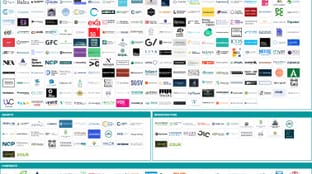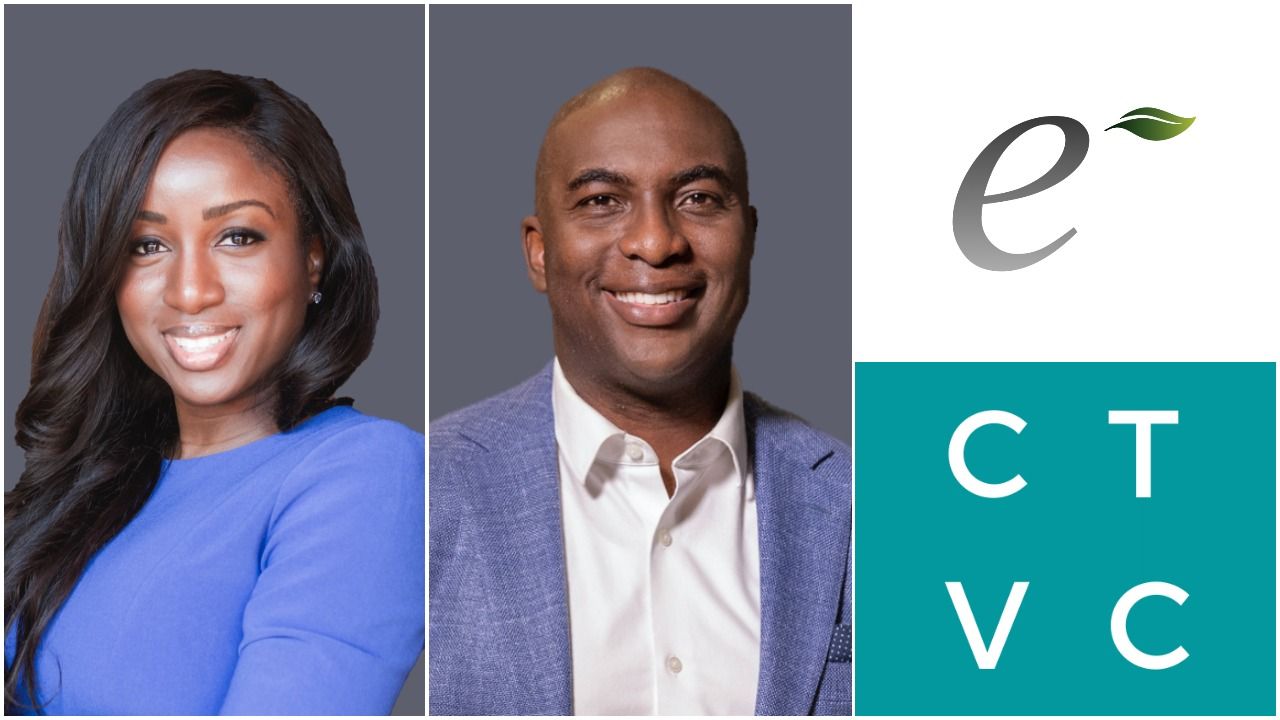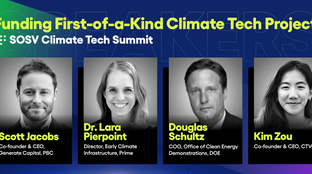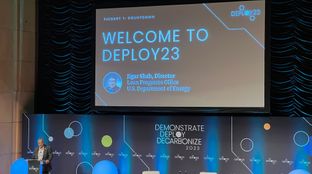
🌏 Who are the Climate Tech Investors?
A new interactive Climate Capital Stack Map
Energy Impact Partners launches the Elevate Future Fund, plus some DEI resources for climate tech

Amidst the week’s twitterpation over mega AUMs, a new fund stood out to us from its bigger peers for its thoughtfulness and targeted approach. The $120m Elevate Future Fund, a sub-fund of Energy Impact Partners (transparently: where Kim is an investor), looks to expand access and opportunities for underrepresented entrepreneurs and communities advancing the low carbon economy. Elevate Partner Anthony Oni and Principal Vida Asiegbu bring their personal experiences as climate tech founders and operators to the investor table, and are already walking the talk with investments like ChargerHelp!. We wrap with a list of resources for individuals and organizations promoting diversity, equity, and inclusion in climate tech.
How did both of your experiences lead to your new role leading the Elevate Fund at EIP?
Anthony: I've spent the last 20 years working in the utility space at Southern Company. My roles at Southern gave me a unique vantage point on the importance of utilities as infrastructure partners in communities as well as key stakeholders in unlocking clean and sustainable energy. Across my various roles at the company, working on our renewable energy program and enabling residential customers to buy renewable energy really got me into this space. We took something that had three years of very low customer engagement, made it easier for our customers to access, and grew the program by almost 800% in one year. That was the key insight to developing a better carbon offset market that led me to found Cloverly, a startup which helps brands create carbon neutral experiences for their customers by calculating the carbon impact of digital transactions and offsetting them in real-time with an API. Fundraising for Cloverly first led me to the folks at EIP. Fast forward a few years - this nexus between investing in black and brown underrepresented founders and climate is a great medium for me to have impact.
Vida: I took a different route to my end goal of investing, by starting in investment banking. My work to cultivate a pipeline of early-stage, underrepresented founders during my time in banking was the starting point for my transition into sustainability. In my most recent position at 13 Ventures, I developed a keen understanding of the interplay of different capital sources. My work helped me recognize that EIP’s Elevate fund would be a differentiated opportunity to marry varied capital sources with the diverse founders and companies that need it the most while pushing forward the energy transition mission. When it comes to underrepresented founders, they do not have the luxury of raising “friends and family” capital. With the Elevate fund’s Credit approach, we are able to support underrepresented founders with seed-stage, non-dilutive capital. In my new seat, I satisfy my personal and professional interests and have been fortunate to find a great group of people at EIP dedicated to this mission.
In your Quartz op-ed, you noted that 3% of VCs are Black or Latino and 1% of VC funding goes towards Black or brown entrepreneurs. What’s led to this lack of diversity?
Anthony: This is not an issue that was created overnight. In citing these numbers, I often think about the inverse - where 97% are white people in these seats. VC is a network-driven business and a majority of this network has continued to fit a certain profile. Historically, underrepresented founders have not been a part of these networks nor plugged into the right circles. There aren’t enough people like Vida and me in these investing spaces who have a broader view beyond traditional networks to fully appreciate how diverse founders can contribute to climate innovation.
Vida: When it comes to fixing the diverse entrepreneur funding problem, Investment Committee decision makers need to be able to understand founders’ backgrounds and pound the table for them. One line of defense is to increase the diversity of VCs in the ecosystem. The other part is providing better access to necessary resources. For example, education about types of capital and where to find it. Venture equity can either be like jet fuel to a company, or a detriment if it’s not used strategically. As information gets shared more broadly, we are entering into an age where underrepresented founders can catch up - because we are in catch-up mode when it comes to diversity in the venture ecosystem.
Anthony: We’re having to catch up now because this is a problem that has compounded over the years. The same networks are creating more wealth, and cycling that back into growth capital for themselves. At the Elevate Future Fund we’re not only providing capital, but also the programmatic support to help founders level the playing field. Our capital comes with mentorships, embedded networks, and infrastructure needed to support that ecosystem. This is a longtail effort and with all of the attention that we've seen in the past 18 months on Black, brown, and underrepresented founders, I don’t think that capitalism alone will solve this problem. We need the amplification, but also need to spend the time building the pipeline and infrastructure to cultivate that next generation of underrepresented talent.
What’s the tie between climate tech and diversity? Why the specific focus on funding underrepresented founders in climate tech?
Anthony: Climate change and underrepresented communities are directly tied. Across the world’s different transitions, with the most recent being the current digital revolution, so many people have been left behind in that transition. As we think about the climate transition, Black and brown communities disproportionately suffer the most from the impacts of climate change. This multi-trillion dollar clean energy transition is one where we have to be very intentional in funding entrepreneurs that are solving problems in their communities. I spoke to a founder in Texas, who’s a chemical engineer by training. She told me that the state of Texas has spent over $100m to landfill plastics. Everyday she drove past those landfills until she finally decided to use her chemical engineering background to come up with new composites from recycled plastics. Unless you understand the effects of living by a landfill, you probably wouldn't have the same motivation to solve these problems that she does. That's a great example of why the Elevate Fund exists; we want to make sure that more people have access to capital and resources to solve climate change.
Vida: Everyone consumes energy, and the new clean energy that we are bringing online should reflect the needs of all stakeholders. We should all have a seat at the table when it comes to discussing what our energy future looks like. That is why it is so important to bring founders who can make an impact to the forefront.
How does the launch of EIP’s Elevate Fund address this critical funding gap? How did the Elevate fund come to life?
Anthony: I couldn't be more excited about what we've announced. It's a lot of work that the EIP team and leadership have put in, and really speaks to the focus that our LPs have given to this effort. The Elevate Future Fund is a tool to ensure that Black and Brown, Latinx, LGBTQ and Indigenous founders have access to the capital and resources to be able to shape an inclusive clean energy, low carbon future. The fund itself is constructed in a way where we have the tools to address the issue of access - whether it be through direct equity or credit investments - but also supercharge the ecosystem through investments in other funders so that we can make an impact with a higher multiple. So we’re really excited about where we are, currently targeting a $120m fund.
One of the best parts about Elevate fund is that we’re embedded into the EIP platform which is underpinned by our incredible commercialization, research and strategy team along with a network of utilities and other strategic partners who are full of expertise and talent. Our LPs make up over +$45b in annual capex spending and we’ve already driven more than $400m in business to our portfolio companies. So when we invest in underrepresented founders solving real issues in the climate transition, we have the ability to make that dollar of investment grow and scale by providing them access to our LPs. On top of that, we’re proactively spending time to create a diverse talent pipeline to address this issue even more rapidly.
What’s the significance of your Corporate LPs and utility partners like Microsoft, Southern, and Xcel coming into Elevate?
Anthony: I think it speaks volumes. Utilities and strategic partners like Microsoft all realize this need to move towards a low carbon economy. What I love is that these institutions are putting capital to play and making sure that diversity, equity and inclusivity is part of that process. It’s a testament to the vision of our EIP leadership, as well as to the funders and LPs making this happen.
Vida: We have motivated supporters, especially since this is their mission within each of their respective organizations. We are working towards a common goal and leveraging our collective expertise to help solve the lack of diversity. There are organizations already doing great things, like Southern and Xcel diving headfirst into increasing supplier diversity. We’ll also be working with partners like Microsoft’s Climate Innovation Fund to better measure and hold the industry accountable for ESG, and the Social Impact piece specifically. It’s great to have this host of partners working with us, and we look forward to having more companies join the party.
What are the innovations or resources outside of capital alone that are necessary to build an equitable VC ecosystem?
Anthony: Capital is obviously a critical piece but beyond that we’re focusing on programmatic support for underrepresented founders. Both Vida and I serve as mentors in different networks to identify and support founders, especially in those early stages. We're being very deliberate not only in the way that we're funding other funds, but also in making sure that we are cultivating that talent pipeline early - whether it be the engagements we have coming online with HBCUs (historically Black colleges and universities) to reach a more diverse student population or pipeline organizations like TechStars. We want to nurture and grow these environments to make it easy to facilitate dialogue with underrepresented entrepreneurs, in networks that have historically been closed off to them. Likewise, we’re investing in talent and being thoughtful about encouraging and supporting startups to grow diverse talent internally. We’re talking to the HR leaders and CEOs to make sure that they’re seeding their companies with diverse talent. If you start off right, it'll pay dividends down the road.
Vida: This is where bringing in other funds comes into play so that we can share resources and create a more robust network. Through EIP’s platform there is an opportunity for revenue growth between our portfolio companies and LP partners. We are looking to duplicate that same level of support through our platform by investing in other funds that are helping to build and contribute to the ecosystem.
What opportunities in credit funding will the Elevate Future Fund address?
Anthony: Part of our broader view is that small, minority-owned businesses are the critical step in addressing underrepresentation. We’re making a conscious effort to invest in diverse supply chains that support local communities and our utility and strategic partners as a whole. Looking down the road, we want to be investing the right type of capital - equity or credit - to create super-regional and national Tier 1-2 suppliers in our industry. These are longtail investments that we need to start doing now so that we have more optionality and inclusion in the future. Our partners have pledged to increase their diversity spend, and we want to galvanize minority businesses by identifying and funding the ones that would benefit from that capital.
What other stakeholders should be at the diversity table that aren’t today?
Vida: We want to bring the automotive industry to the table. Auto is one of the most emissions-intensive industries and is quickly undergoing a transition to electrification. We need to make sure that, for example, clean cars are accessible at a variety of price points. Auto OEMs, at a minimum, would benefit from joining Elevate to gain access to market disruption with a DEI lens.
Anthony: Double clicking on that, educational institutions, specifically HBCUs need to be further involved to ensure that we are creating a diverse talent pipeline. Less than a fifth of workers in the clean energy sector are Black. It’s imperative that we engage with universities as early as we can to attract people into this field. Referencing back to the digital transition - many people in our communities weren’t able to participate because they weren’t trained or ready. We see this clean energy transition coming, and will work proactively with educational stakeholders to prepare the community to participate.
What companies would you point to that have gotten diversity and inclusion right?
Anthony: I’d highlight ChargerHelp! It’s a great example of two African American females who are active in the electric transportation space. Their unique backgrounds shaped their approach on workforce and job opportunity needs in climate tech. We’re really excited that they’re one of our first investments out of the Elevate Fund. [Read CTVC’s past feature on ChargerHelp! here.]
Many resources and communities are already active at the intersection of climate tech venture and diversity. The initiatives below deserve further attention from the VC community, and hopefully inspire underrepresented folks who are active in - or curious about - the climate tech space.
Have other DEI resources to add? Drop us a note and we’ll add it to the list!

A new interactive Climate Capital Stack Map

Financing around first- or early-of-a-kind project risk

‘Government-enabled, private sector-led’ in action in Washington, DC